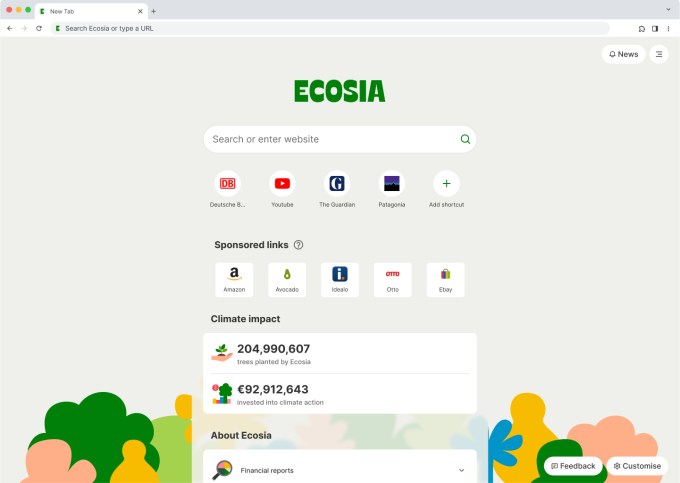
Ecosia, the search engine that funds tree-planting initiatives with a portion of its search ad profits, has launched a new cross-platform browser to grow its online footprint.
The new browser, available for Mac, Windows, iOS and Android, is built on top of Google’s open source browser project Chromium, which explains why there aren’t many differences to Google’s own Chrome browser. While the desktop versions are new launches, mobile versions replace older search products.
However, the Germany-based company sees that as a good thing, as users might be more tempted to switch if the experience they’re accustomed to is similar. Ecosia does allow the user to customize the landing page, and remove sections that aren’t to their liking, such as top sites or the climate impact widget.

Sustainability
Michael Metcalf, Ecosia’s chief product officer, told TechCrunch that the company expanded into browsers so that it could grow its sustainability pledge.
“The main reason we are building a browser is because we want to go where our users are and start to expand the footprint of where they can be sustainable,” Metcalf said. “Right now, our main use case is around search, but we want to expand into parts of browsing experiences.”
With this new browser, Ecosia is also starting an affiliate shopping program, meaning that users will see links to shopping sites such as Amazon, eBay and Decathlon under the sponsored links section. The company said all the money earned through affiliate revenues will go toward planting trees and backing similar green projects. Through this kind of investment, Ecosia has committed to generating 25Wh of clean energy per user each day.
Metcalf said that while the company promotes lower consumption, it’s acutely aware that consumers like to shop online. With the affiliate program, they have an opportunity to give back. In the future, the company also wants to improve the affiliate shopping interface, integrate its AI chatbot and introduce more customization to the browser.
Acknowledging that it’s tough to get users to switch browsers, the company is initially targeting its existing search engine user base of 20 million, while it will also increase its marketing targeted at consumers who already demonstrate an affinity with the “green” cause. The company said that it was happy with the retention rate in its early beta testing, but it wouldn’t share any data on the impact on Ecosia search traffic resulting from those using the new browser.
Ecosia made a few structural changes to its search engine last year. After years of using Bing as its sole search provider, the company started experimenting with Google Search in markets like Canada, New Zealand, Brazil and the Philippines. The company uses System1, an ad tech company that syndicates search results from Microsoft Bing, Startpage and Info.com.
Earlier this year, Ecosia also crossed the mark of planting more than 200 million trees across 95,000 locales globally.
Ecosia adds a train travel search tool powered by Omio




